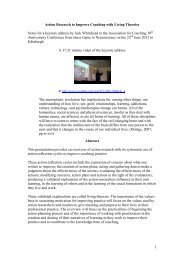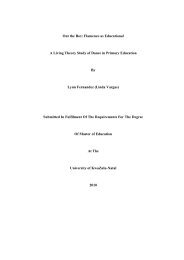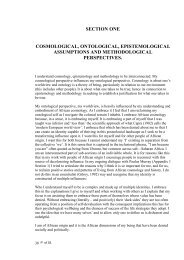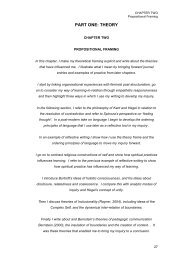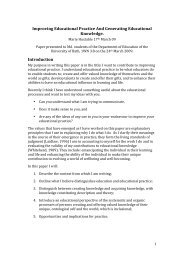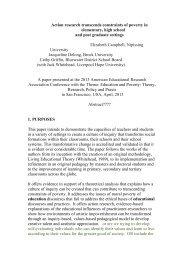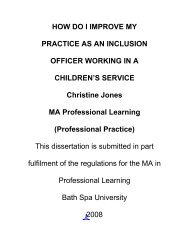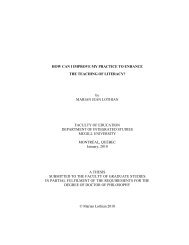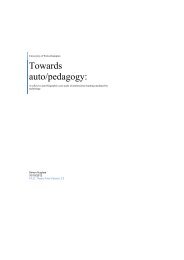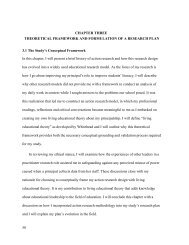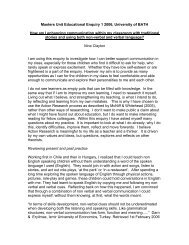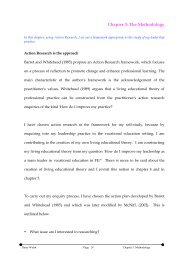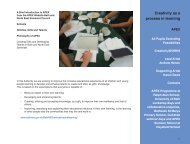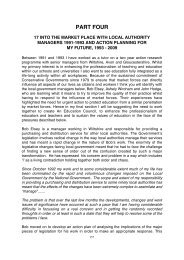How do I contribute to the education of myself and others through ...
How do I contribute to the education of myself and others through ...
How do I contribute to the education of myself and others through ...
You also want an ePaper? Increase the reach of your titles
YUMPU automatically turns print PDFs into web optimized ePapers that Google loves.
Sequence 1 Values in Educationintention (a human goal) <strong>to</strong> produce something valued which is not yet inexistence.’ (Whitehead, 1993, p. 80)This reflects <strong>the</strong> dialogue between me <strong>and</strong> Mark as we continue <strong>to</strong> explore our<strong>education</strong>al development. The notion <strong>of</strong> living <strong>the</strong>ory is something that I can engagewith, particularly in terms <strong>of</strong> my underst<strong>and</strong>ing <strong>of</strong> living <strong>myself</strong> <strong>through</strong> o<strong>the</strong>rs, where Idefine living as something that is in process. Essentially, this <strong>the</strong>sis is an example <strong>of</strong>living <strong>education</strong>al <strong>the</strong>ory as it attempts <strong>to</strong> explain my own <strong>education</strong>al development<strong>through</strong> past reflection <strong>and</strong> future projection.I would argue that this type <strong>of</strong> dialogue as illustrated in <strong>the</strong> email above with Mark isan example <strong>of</strong> <strong>the</strong> life affirming force <strong>and</strong> energy (Whitehead, 2005) that is presentwithin teacher-research. This reflects Evans’ (1995) thoughts in her <strong>the</strong>sis, where shecomments:‘I believe that <strong>through</strong> <strong>the</strong> support <strong>of</strong> action research metho<strong>do</strong>logy,particularly, <strong>the</strong> support <strong>of</strong> <strong>the</strong> community <strong>of</strong> action researchers <strong>and</strong> <strong>the</strong>dialogue <strong>the</strong>se communities promote, teachers can become effectiveresearchers <strong>of</strong> <strong>the</strong>ir practice <strong>and</strong> <strong>contribute</strong> <strong>to</strong> both <strong>education</strong>al researchmetho<strong>do</strong>logy <strong>and</strong> epistemology, not in <strong>the</strong> form <strong>of</strong> ‘critical <strong>the</strong>ory’ but in <strong>the</strong>sense <strong>of</strong> ‘living <strong>education</strong>al <strong>the</strong>ory’.’ (Evans, 1995)Again, as I exchange dialogue with Mark I am aware <strong>of</strong> <strong>the</strong> support <strong>and</strong> challengewe are providing for each o<strong>the</strong>r as we wrestle with our underst<strong>and</strong>ings <strong>of</strong> our values<strong>and</strong> practice. Through <strong>the</strong>se dialogues, we are developing <strong>the</strong> epistemology <strong>and</strong> alsocontributing <strong>to</strong> a living metho<strong>do</strong>logy that is responding <strong>to</strong> <strong>the</strong> nature <strong>of</strong> <strong>the</strong>relationship that we have. We are seeking <strong>to</strong> promote our epistemologies as <strong>the</strong>yemerge from within our practice.Kincheloe (2003) fur<strong>the</strong>r reflects this notion in his vision <strong>of</strong> teacher-research <strong>and</strong>reflects Whitehead’s (1993) comments <strong>of</strong> <strong>the</strong> need for experiential learning <strong>and</strong>reflection within <strong>education</strong>, commenting:‘In such a new democratised culture teacher scholars begin <strong>to</strong> underst<strong>and</strong> <strong>the</strong>power implications <strong>of</strong> technical st<strong>and</strong>ards. In this context <strong>the</strong>y appreciate <strong>the</strong>benefits <strong>of</strong> research, especially as <strong>the</strong>y relate <strong>to</strong> underst<strong>and</strong>ing <strong>the</strong> forcesshaping <strong>education</strong> that fall outside <strong>the</strong>ir immediate experience <strong>and</strong>perception. As <strong>the</strong>se insights are constructed, teachers begin <strong>to</strong> underst<strong>and</strong>what <strong>the</strong>y know from experience. With this in mind <strong>the</strong>y gain heightenedawareness <strong>of</strong> how <strong>the</strong>y can <strong>contribute</strong> <strong>to</strong> <strong>the</strong> research on <strong>education</strong>. Indeed,38



